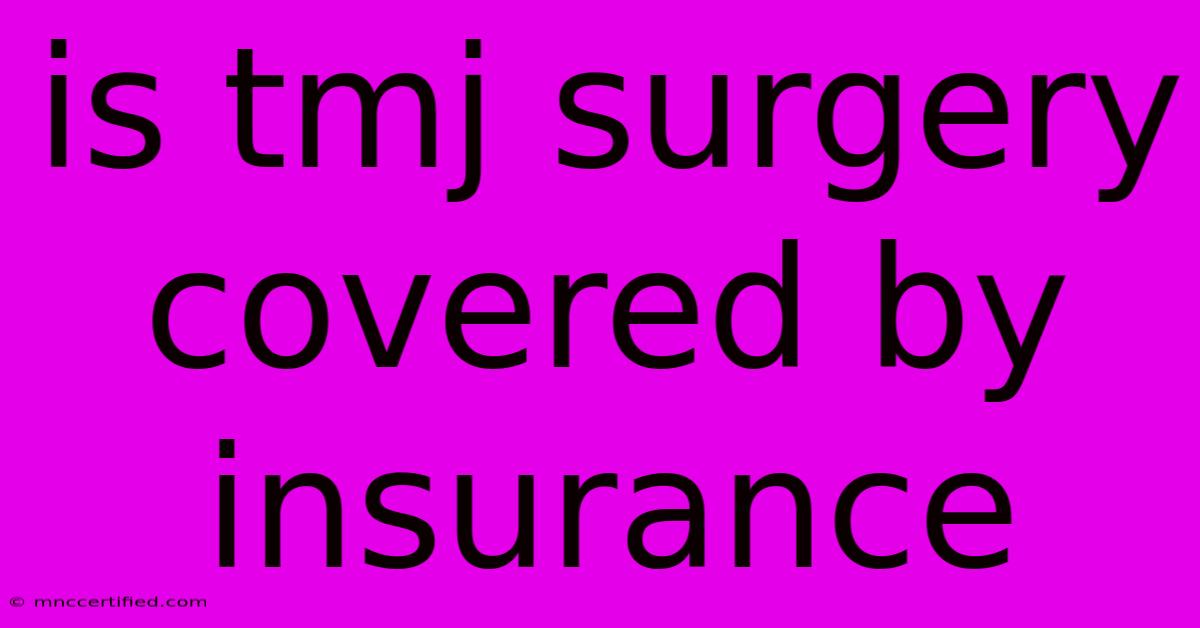Is Tmj Surgery Covered By Insurance

Table of Contents
Is TMJ Surgery Covered by Insurance? A Comprehensive Guide
Temporomandibular joint disorder (TMJ) can be a debilitating condition, causing pain, clicking, and limited jaw movement. While non-surgical treatments are often the first line of defense, some individuals may require TMJ surgery to alleviate their symptoms. A common question that arises is: is TMJ surgery covered by insurance?
The answer isn't simple. Coverage for TMJ surgery varies widely depending on several factors, including your insurance plan, the specific procedure, and the severity of your condition.
Understanding TMJ Surgery and Insurance Coverage
Here's a breakdown of what you need to know about insurance coverage for TMJ surgery:
1. Types of TMJ Surgery:
- Arthroscopy: A minimally invasive procedure to diagnose and treat TMJ issues.
- Open Joint Surgery: A more complex procedure for severe TMJ problems.
- Joint Replacement: Replacing the TMJ joint with a prosthesis.
2. Insurance Plan Variations:
- Individual vs. Group Plans: Group health insurance plans generally offer better coverage than individual plans.
- Plan Deductibles and Co-pays: You may be responsible for paying a deductible and co-pay before insurance coverage kicks in.
- Pre-Authorization Requirements: Many insurance companies require pre-authorization for TMJ surgery. This involves getting your doctor to submit a detailed request for approval before the procedure.
3. Severity of Your Condition:
- Medical Necessity: Insurance companies typically only cover procedures deemed medically necessary. They may require documentation from your doctor demonstrating that non-surgical treatments have failed and surgery is the only option.
- Diagnostic Tests: Expect to undergo various tests, such as X-rays, CT scans, and MRIs, to establish the severity of your TMJ condition.
4. Pre-Existing Conditions:
- Pre-existing conditions: If you have a pre-existing condition that contributes to your TMJ issues, your insurance company may have limitations on coverage.
5. Out-of-Network Providers:
- Network Restrictions: Your insurance plan may have a network of preferred providers. If you choose to see an out-of-network surgeon, your coverage may be limited or nonexistent.
6. Negotiating with Your Insurance Company:
- Appealing Decisions: If your insurance company denies coverage for TMJ surgery, you can appeal their decision. Be prepared to provide additional documentation and evidence supporting the medical necessity of the procedure.
7. Cost-Sharing Options:
- Health Savings Accounts (HSAs) and Flexible Spending Accounts (FSAs): These accounts can be used to pay for qualified medical expenses, including TMJ surgery.
Finding the Right Information
- Contact Your Insurance Provider: The best way to find out about your specific TMJ surgery coverage is to directly contact your insurance company.
- Ask Your Doctor: Your doctor can provide insights into your insurance coverage and help navigate the pre-authorization process.
It's important to note that insurance coverage for TMJ surgery can be complex and vary greatly. Don't hesitate to research your options thoroughly and seek professional advice to understand your coverage and explore financing options if necessary.

Thank you for visiting our website wich cover about Is Tmj Surgery Covered By Insurance. We hope the information provided has been useful to you. Feel free to contact us if you have any questions or need further assistance. See you next time and dont miss to bookmark.
Featured Posts
-
Frank Auerbach Renowned Painter Dead At 93
Nov 13, 2024
-
Green Day Headlines Download 2025 With Mc Fly Sex Pistols
Nov 13, 2024
-
Life Insurance Awareness Month 2024
Nov 13, 2024
-
Doves 2025 Tour Constellations For The Lonely
Nov 13, 2024
-
Kyle Singlers Well Being Nba Reactions
Nov 13, 2024